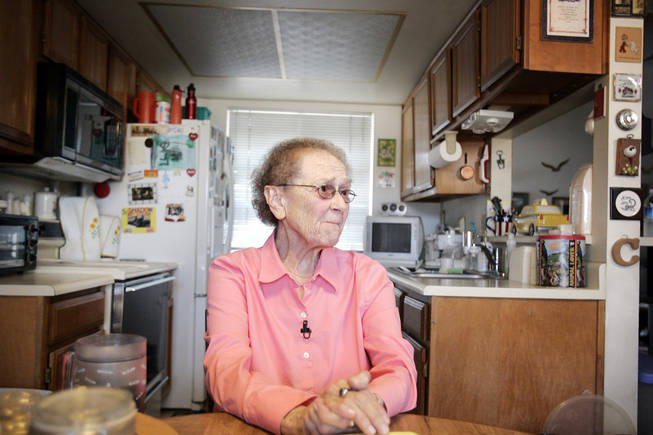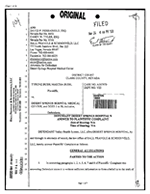
Carole LaRocca had surgery in 2003 and contracted a MRSA infection while at the hospital. Nevada law requires hospitals to report such infections as “sentinel” events and then investigate the causes to try to prevent future occurrences.
Monday, Aug. 9, 2010 | 2 a.m.
Do No Harm: Hospital Care in Las Vegas, Part 2
- A hidden epidemic
- Hospital stay will stay with her always
- VA system stanching MRSA
- Hospital’s sanitation promises quickly forgotten
- Billing codes key to data analyzed on infections
- Where I Stand: Rise in infection rates, hospitals’ reticence are troublesome
- Editorial: Hospitals should do more to protect patients from deadly bacteria
- ‘We’re the ones who are in there. Our lives are entrusted to them.’
- Health board backs limits on disclosure of infections
- How best to stem spread of infection?
- St. Rose breaks ranks with disclosure on quality of care
Share your stories
The Sun’s investigation into lethal bacteria in Las Vegas hospitals has identified more apparent underreporting by hospitals of the number of times patients are infected at the facilities.
Nevada law explicitly says that hospital-acquired infections are “sentinel” events — meaning facilities need to report them to the state and conduct analyses of how infections were caused to prevent them from occurring in the future.
Hospitals statewide reported 75 total infections as sentinel events in 2009.
But in its analysis of state records from 2009, the Sun identified 1,052 hospital-acquired cases of Methicillin-resistant Staphylococcus aureus, or MRSA, and Clostridium difficile, known as C. diff.
Assemblywoman Barbara Buckley, who was instrumental in getting the sentinel-events law passed in 2002, called the gap “staggering” between what the hospitals report and what is shown in their billing records on file with the state.
“There tends to be underreporting when there’s bad news to report. It’s human nature,” said Buckley, the current speaker. “But you can’t change practices if you don’t learn of the problem in the first place.”
The purpose of reporting sentinel events is to allow the state to examine the events, for consumers to learn about them and for hospitals to ensure they are not repeated, she said.
The Sun analyzed hospital billing records as part of its two-year investigation: “Do No Harm: Hospital Care in Las Vegas.” On Sunday, the Sun reported 2,010 instances in 2008-09 where patients were infected with MRSA or C. diff — deadly bacteria that thrive in hospitals.
The Sun asked the 13 Las Vegas-area acute-care hospitals to explain how they determine which infections they report as sentinel events. They did not answer the question.
When the Sun began reporting the results of its investigation June 27, it identified similar underreporting. In the wake of the newspaper’s findings, the Nevada State Health Division, which licenses hospitals and investigates complaints, conducted an analysis of the billing records and found that hospital patients suffered 342 preventable injuries or infections during the second half of 2009, all of which might fit Nevada’s definition of a sentinel event. During that time period, the hospitals reported only 44 sentinel events.
The hospitals said at the time that many of the injuries and infections identified would not qualify as sentinel events because they were not “unexpected,” as is required under Nevada law. The billing records do not include clinical detail required to determine whether an injury or infection is a sentinel event, they said.
The state is reviewing medical records on each of the 342 cases it identified to determine whether they should be considered sentinel events, said Richard Whitley, administrator of the state Health Division. Additionally, the state will review the MRSA and C. diff cases identified by the Sun, Whitley said.
Such hospital-acquired infections would be considered sentinel events that need to be reported, Whitley said.
“The standards are already in place, it’s the adherence to them,” Whitley said of apparent underreporting by hospitals. “Did they make an error in the billing? Then correct that. If it was a hospital-acquired condition, then do the review of it and the corrective action plan and report it as a sentinel event.”
Assemblywoman Sheila Leslie, D-Reno, said she is preparing legislation for the 2011 session that will clarify the definition of sentinel events and add transparency to the reporting. The Legislative Committee on Health Care also is considering legislation to bring more transparency to sentinel events reporting.
Dr. Ihsan Azzam, state epidemiologist, said he did not know the number of MRSA and C. diff cases until informed by the Sun.
MRSA infections are not reported to any health agency for the purpose of studying disease trends, “and if it’s not reported, I wouldn’t really know it existed,” Azzam said.
As a result of the Sun’s analysis, the state will, for the first time, study the billing data to calculate the number of bacteria infections in hospitals and compare those rates among the hospitals over time, Azzam said.
Whitley said the hospitals should be analyzing their own billing data to identify where and when the infections occur and to implement strategies to better prevent them.
“We want the hospitals to correct it and ideally be self-managing,” Whitley said.
The Centers for Medicare & Medicaid Services, the government’s insurance payer, no longer reimburses hospitals for complications arising from certain hospital-acquired infections.
Private insurance companies are moving in the same direction, said Leslie Johnstone, executive director of the Health Services Coalition, which includes about two dozen self-funded insurance plans in Nevada.
The Sun’s findings came as a surprise to Johnstone, who said the hospitals indicated to insurers that their infection rates were going down, she said. The Sun’s findings highlight the importance of transparency, she said.
“Then we don’t have to be subject to interpretation about whether their programs are working or not,” Johnstone said.
If insurance companies stopped paying for the hospital-acquired infections, then hospitals would realize quickly that it’s in their best interests to prevent them, she said.




Join the Discussion:
Check this out for a full explanation of our conversion to the LiveFyre commenting system and instructions on how to sign up for an account.
Full comments policy